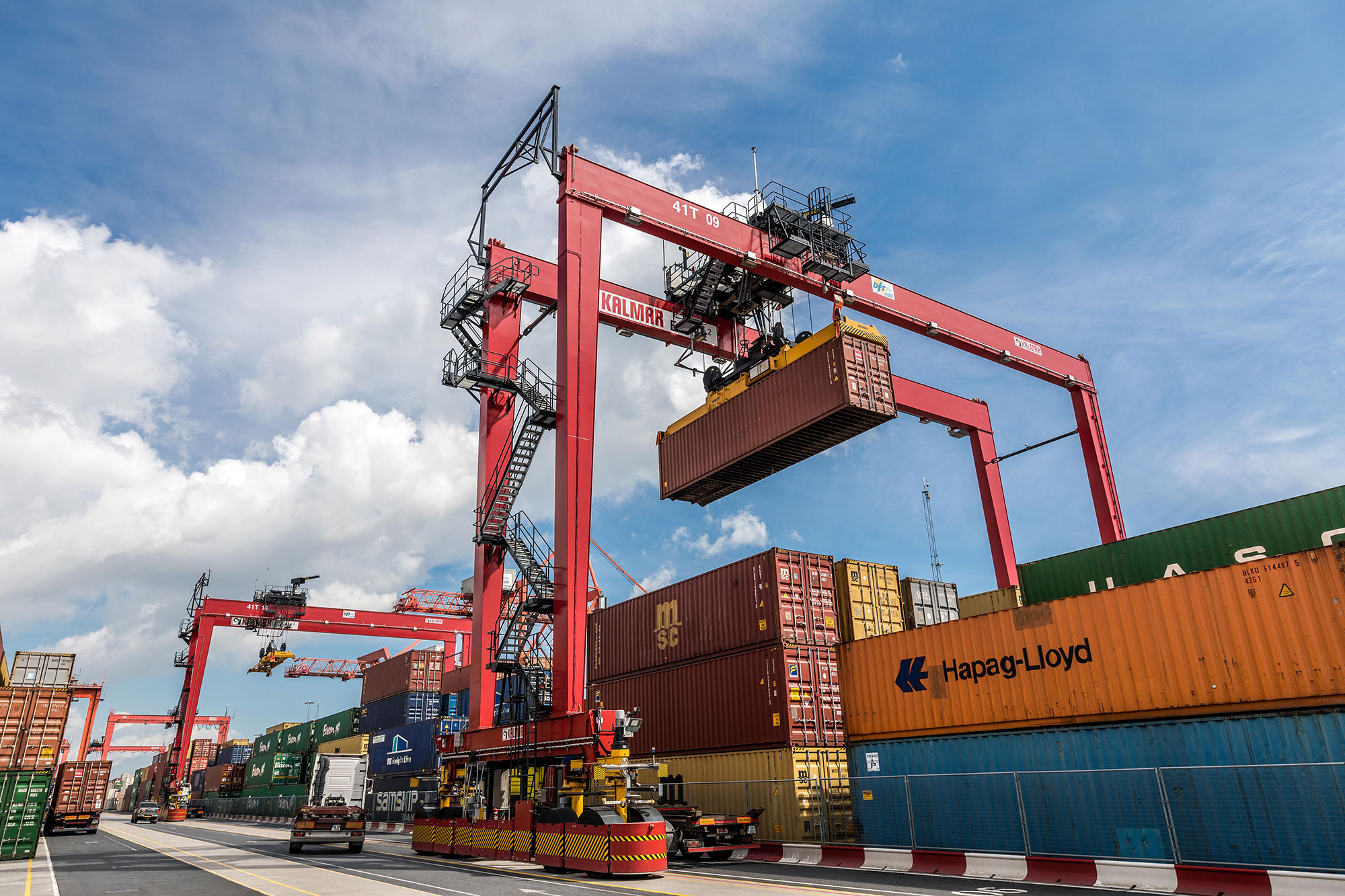
In April 2019, the Group entered into a bareboat hire purchase agreement for the sale of the cruise ferry Oscar Wilde to MSC Mediterranean Shipping Company SA. The total gross consideration for the sale is €28.9 million, payable in instalments over 6 years, up to 2025. This has resulted in profit on disposal in the year of €14.9 million.
In the prior year, the Group completed the sale of the vessel Jonathan Swift generating a non-trading item of €13.7 million.
Taxation
The tax charge is €1.3 million compared with a charge of €1.4 million in 2018. The corporation tax charge of €1.2 million (2018: €1.5 million) comprises Irish and UK corporation tax. Certain activities qualify to be taxed under tonnage tax (which is an EU approved special tax regime for qualifying shipping activities) in Ireland. Reconciliation of the tax charge showing the effect of the tonnage tax regime on the Group’s tax charge is shown at note 8. The deferred tax charge was €0.1 million in 2019 (2018: €0.1 million credit).
Earnings per share
Basic EPS was 31.7 cent compared with 30.4 cent in 2018. The reason for the increase in Basic EPS is due to the increase in profit attributable to equity holders of the parent to €60.2 million (2018: €57.8 million) with no significant movement in the average shares in issue.
Adjusted EPS (before the net interest cost on defined benefit obligations and non-trading items) was 23.8 cent compared with 23.1 cent in 2018.
Cash flow and investment
EBITDA for the year was €86.8 million (€77.4 million pre IFRS 16*) (2018: €68.4 million). There was a net inflow of €2.0 million, due to positive working capital movements, payments in excess of service costs to the Group’s pension funds of €1.3 million and other net cash inflows amounting to €2.0 million yielding cash generated from operations amounting of €89.5 million (2018: €64.7 million).
Interest paid was €3.5 million (2018: €1.0 million) while taxation paid was €1.2 million (2018: €2.2 million).
Capital expenditure outflows amounted to €54.1 million (2018: €176.1 million) which included €42.5 million of strategic capital expenditure related to the purchase of the container vessels Thetis D and CT Rotterdam, and other fleet improvements.
Dividend payments of €24.7 million (2018: €23.5 million) were made during the year and €12.9 million was expended in buying back the Group’s equity.
The application of IFRS 16 increased year end net debt by €36.0 million comprising the initial application of IFRS 16 increasing lease obligations at implementation date by €31.0 million together with additions during the period of €12.5 million. These amounts were reduced by capital repayments.
The above cash flows resulted in a year-end net debt of €129.0 million (2018: €80.3 million net debt), which comprised gross borrowing of €203.9 million, lease obligations of €36.0 million offset by cash balances of €110.9 million. The key Net Debt/ EBITDA (pre non-trading items) ratio was 1.5 times.
Dividend and share buybacks
During the financial year a final dividend of 8.56 cent per ICG Unit was paid for the financial year ended 31 December 2018 and also an interim dividend of 4.42 cent per ICG Unit was paid for the financial year ended 31 December 2019. The Board is proposing a final dividend of 8.99 cent per ICG Unit in respect of the financial year ended 31 December 2019.
During the year the Group also bought back 2.9 million shares representing 1.5% of the issued equity at 1 January 2019. These shares were cancelled. The total consideration paid for these shares was €12.9 million.
Pensions
The Group sponsors four separately funded defined benefit pensions schemes covering employees in Ireland, the UK and the Netherlands. The Group also participates in the UK based industry-wide scheme, the Merchant Navy Officers Pension Fund (MNOPF) in which participating employers share joint and several liability. Aggregate pension assets in the four Group-sponsored schemes at year end were €298.4 million (2018: €264.3 million), while combined pension liabilities were €289.6 million (2018: €266.0 million).
The total net surplus of all defined benefit pension schemes at 31 December 2019 was €8.8 million in comparison to €1.7 million deficit at 31 December 2018.
Financial risk management
The principal objective of the Group’s treasury policy is the minimisation of financial risk at reasonable cost. To minimise risk the Group uses interest rate swaps and forward foreign currency contracts. The Group does not trade in financial instruments.
Interest rate management
The interest rates on Group borrowings at 31 December 2019 comprising loan notes and finance lease obligations has been fixed at a contracted rate at the date of drawdown with the relevant lender eliminating exposure to interest rate risk on borrowings. The average effective interest rate at 31 December 2019 was 1.60%. At 31 December 2019, all of Group borrowings were at fixed rates at an average effective rate of 1.62%. Debt interest cover, for the year was 65 times (2018: 65 times).
Currency management
The Group has determined that the Euro is the operating currency in which it reports its results. The Group also has significant Sterling and US Dollar cash flows. The Group’s principal policy is to minimise currency risk by matching foreign currency assets and liabilities and to match cash flows of like currencies. Sterling revenues and expenses are netted. Exposure to the US Dollar relates mainly to fuel costs. The Group has in place fuel surcharge arrangements with its commercial customers which recovers a portion of movements in euro fuel costs above a base level which partially mitigates the exposure to US dollar currency movements.
Commodity price management
Bunker oil costs constitute a separate and significant operational risk, partly as a result of historically significant price fluctuations. In the Container and Terminal division bunker costs above a base level are offset to a large extent by the application of prearranged price adjustments with our customers. Similar arrangements are in place with freight customers in the Ferries division. In the passenger sector, changes in bunker costs are included in the ticket price to the extent that market conditions will allow. Bunker consumption was 122,000 tonnes in 2019 (2018: 108,600 tonnes). The cost per tonne of heavy fuel oil (HFO) fuel in 2019 was 3% higher than in 2018 while marine gas oil (MGO) was 2% lower than in 2018.
Credit risk
The Group’s credit risk arising on its financial assets is principally attributable to its trade and other receivables. The concentration of credit risk in relation to trade is limited due to the exposure being spread over a large number of counterparties and customers. Other receivables include deposits paid under a shipbuilding contract which are secured through letters of credit issued by high quality insurers. The Group also has a significant long-term receivable relating to a bareboat hire purchase arrangement which is secured by retention of title to the vessel.
Liquidity
It is Group policy to maintain available facilities which allow the Group to conduct its business in an orderly manner. The target level is reviewed from time to time in line with the Group’s future requirements over the medium term and will comprise cash deposits and committed banking facilities. Total available facilities at 31 December 2019 amounted to €201.3 million comprising cash balances of €110.9 million together with undrawn committed facilities of €90.4 million with average maturity of 4.1 years. Total drawn facilities of €205.0 million had an average maturity of 6.2 years over remaining terms of up to 11 years.
David Ledwidge,
Chief Financial Officer
4 March 2020
